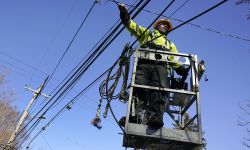‘Deepfake’ pornography ban passes Michigan House with bipartisan support

- Proposed ban on ‘deepfake’ pornography passes Michigan House with wide bipartisan support
- Bills would criminalize creation and distribution of pictures or video falsely portraying sexual activity
- Supporters argue bills are necessary to protect victims of deepfake attacks, but some fear encroachment of First Amendment rights
LANSING — Michigan would become the latest state to criminalize the creation and distribution of fake, sexually explicit depictions of real people under legislation that passed the state House Wednesday.
Supporters of the bills say they’re necessary to combat an incendiary use of artificial intelligence known as “deepfakes,” or realistic media digitally altered to falsely portray a person engaging in sexual activity.
The technology improved since it emerged in 2017 and has often been used to target female celebrities, minors or people in abusive relationships, according to the Organization for Social Media Safety.
A bipartisan plan to criminalize non-consensual creation or dissemination of deepfakes or any media falsely showing a person engaging in sexual conduct passed the House Wednesday in a pair of 108-2 votes.
“With these bills, Michigan will continue to lead the nation in addressing and regulating the potential misuses of artificial intelligence,” sponsor Penelope Tsernoglou, D-East Lansing, said in a speech ahead of voting.
RELATED:
- Michigan targets ‘deepfakes,’ campaign ads that use artificial intelligence
- Severe weather costs Michigan millions. Can funding meet demands?
- StubHub backs Michigan effort to battle ticket bots
Under the legislation, penalties for creating or distributing sexually explicit deepfakes could range from a misdemeanor to a three-year felony, depending on the severity of crime and whether the creator intended to profit from, harass or threaten the person falsely depicted.
The new legislation focuses on adult victims of deepfakes, as sponsors said similar crimes against minors are already criminalized under child pornography laws.
Creators of deepfakes could also be held liable in civil court under the bills, which would allow victims of the attacks to file civil actions against them.
Sensity AI, a research company tracking online deepfake videos since December 2018, estimates that nonconsensual pornography of women specifically accounts for 90% of all deepfakes on the internet.
The proliferation of deepfakes “a significantly growing threat,” one which could drive a person to suicide, said state Rep. Matthew Bierlein, a Vassar Republican and another sponsor on the bills.
“We must act decisively to protect our constituents from the malicious use of this technology by passing a clear message that non-consensual creation and dissemination of … deepfake images will not be tolerated in our society,” Bierlein said.
The legislation marks the second time in as many years that Michigan lawmakers have moved to regulate the use of deepfakes and artificial intelligence.
A law signed by Gov. Gretchen Whitmer last fall, also sponsored by Tsernoglou, requires disclaimers on digitally altered campaign ads and other political content aimed at swaying voters. Failure to comply could result in up to five years of prison time for repeat offenders.
A separate 2016 state law created criminal penalties for disseminating "revenge porn" in an attempt to threaten, coerce or intimidate the subject.
The new Michigan legislation mirrors efforts in other states to tamp down on deepfakes, particularly in the wake of high-profile cases like an organized deep fake campaign against pop star Taylor Swift.
At least 10 states have laws on the books banning exploitative deepfake sexual content, according to an analysis by USA Today.
But some fear attempts at regulation risk creating more problems than they solve.
Banning deepfakes could run afoul of the First Amendment by stifling satiric creations, argues a 2021 paper from the Regulatory Transparency Project, a nonprofit overseen by the conservative and libertarian learning Federalist Society.
State Rep. Steve Carra, R-Three Rivers, also raised concerns in the House Wednesday that the package would not allow someone to verbally consent to the creation of a deepfake of themselves.
The bill instead would require consent to be “written in plain language” and voluntarily signed “by the depicted individual.”
Carra and state Rep. Neil Friske, R-Charlevoix, were the lone no votes on both bills in the package.
The legislation now moves to the Senate for further consideration.
See what new members are saying about why they donated to Bridge Michigan:
- “In order for this information to be accurate and unbiased it must be underwritten by its readers, not by special interests.” - Larry S.
- “Not many other media sources report on the topics Bridge does.” - Susan B.
- “Your journalism is outstanding and rare these days.” - Mark S.
If you want to ensure the future of nonpartisan, nonprofit Michigan journalism, please become a member today. You, too, will be asked why you donated and maybe we'll feature your quote next time!




